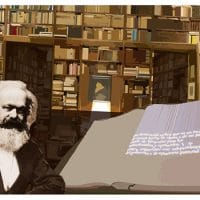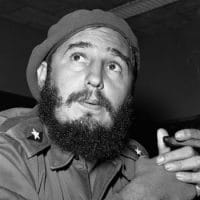-
Venezuela — after the elections: what is to be done?
Marta Harnecker examines the post-electoral context from a broad historical perspective.
-
Reading Marx’s Capital Today: Lessons from Latin America
One hundred and fifty years ago, Karl Marx published his book Capital, an intellectual effort of great breadth, with the aim of revealing the logic of capitalist production and providing workers with theoretical instruments for their liberation. Having discovered the logic of the system, he was able to foresee with great anticipation much of what is happening in the world capitalist economy today. But, we cannot mechanically apply what is outlined in Capital to the current reality of Latin America.
-
Fidel, Today and Forever
You always understood that politics was not the art of the possible—a conservative vision of politics—but rather the art of making the impossible possible, not through voluntarist actions but by understanding that politics is the art of building a social, political, and military correlation of forces that allows us to transform the existing conditions of struggle and make possible in the future what seems impossible in the present.
-
New Paths Require a New Culture on the Left
Speech accepting the 2013 Libertador Prize for Critical Thought, awarded for A World to Build: New Paths toward Twenty-first Century Socialism, Caracas, Venezuela, August 15, 2014 I completed this book one month after the physical disappearance of President Hugo Chávez, without whose intervention in Latin America this book could not have been written. Many of […]
-
Learning About Participation Without an Instructor: Introducing Documentary Videos Produced by MEPLA, the Center for Research on Popular Memory in Latin America
“Here I would like to talk especially about the documentaries that we have produced about the participation of people in communities and how to produce videos for educating grassroots community leaders who in general do not have any formal education but are interested in working in communities.” — Marta Harnecker English Español Marta Harnecker is […]
-
Chávez’s Chief Legacy: Building, with People, an Alternative Society to Capitalism
When Hugo Chávez triumphed in the 1998 presidential elections, the neoliberal capitalist model was already foundering. The choice then was none other than whether to re-establish the neoliberal capitalist model — clearly with some changes including greater concern for social issues, but still motivated by the same logic of profit seeking — or to go […]
-
“We Must Take Public Criticism into Account. Criticism Is Good and Should Help the Process”
What is the characteristic of the Latin American Left today? 20 years ago, when the Berlin Wall fell, there was no revolution foreseeable on the horizon. However, it didn’t take long before a process began to emerge in Latin America with Hugo Chávez. We have gone on to form governments with anti-neoliberal programs, though […]
-
Excessive Centralization Creates Inefficiency and Prevents Authentic Popular Protagonism
1. There Is No Popular Protagonism without Decentralization Popular protagonism becomes a mere slogan if people do not have the opportunity to make their opinions known and take decisions in areas where they participate: (geographic spaces, workplaces, educational establishments, interest groups). If the central state decides everything, there is no room for local initiatives and […]
-
Ideas for the Struggle #4 Should We Reject Bureaucratic Centralism and Use Only Consensus?
This is the fourth in a series of articles on “Ideas for the Struggle” by Marta Harnecker. 1. For a long time, left-wing parties were authoritarian. The usual practice was bureaucratic centralism, very much influenced by the experiences of Soviet socialism. All criteria, tasks, initiatives, and courses of political action were decided by the party […]
-
Ideas for the Struggle #3 To Be at the Service of Popular Movements, Not to Displace Them
This is the third in a series of articles on “Ideas for the Struggle” by Marta Harnecker. 1. We have said before that politics is the art of constructing a social and political force capable of changing the balance of forces in order to make possible tomorrow what appears impossible today. But, to be able […]
-
Ideas for the Struggle #2 Not to Impose But to Convince
This is the second in a series of articles on “Ideas for the Struggle” by Marta Harnecker. 1. Popular movements and, more generally, various social actors who are engaged in the struggle against neoliberal globalization today at the international level as well as in their own countries reject, with good reason, actions that aim to […]
-
Ideas for the Struggle #1 Insurrections or Revolutions? The Role of the Political Instrument
This is the first in a series of articles on “Ideas for the Struggle” by Marta Harnecker. 1. The recent popular uprisings at the turn of the 21st century that have rocked numerous countries such as Argentina and Bolivia — and, more generally, the history of the multiple social explosions that have occurred in […]



